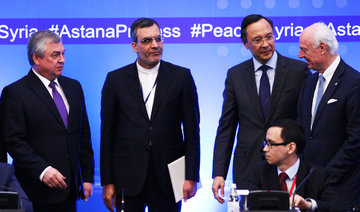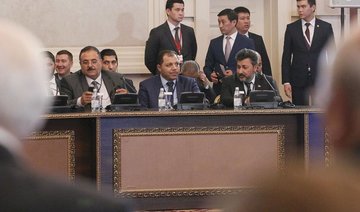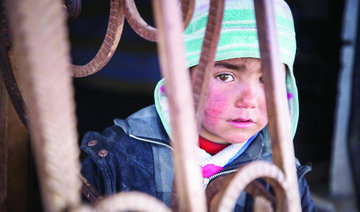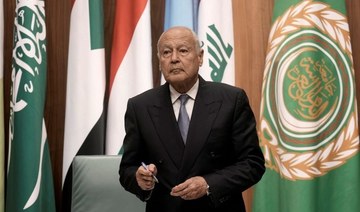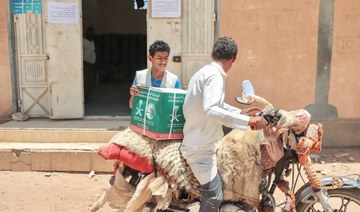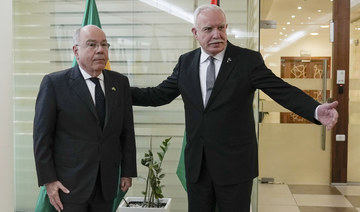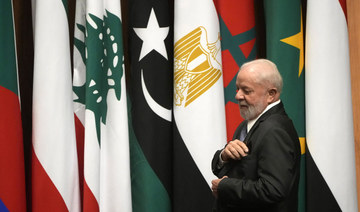LEBANON: Alaa plays the horrifying video she kept on her phone that shows her moments after she was riddled with bullets, her jaw shredded, hand punctured, and chest bleeding. “Did you not see the video?” the Syrian teenager asks visitors, in defiance of its cruelty, to show how far she has come.
It has been a long road. And a missed childhood.
From Alan Kurdi lying dead face down on a Turkish shore, to a dust-covered Omran Daqneesh awaiting help in an Aleppo ambulance, images of Syrian children suffering some of the conflict’s worst horrors have become iconic. Countless others still relentlessly flood the media: children pulled from under bombed buildings, or convulsing after inhaling chemical gas or drowning after boats of fleeing families capsize in choppy seas.
Alaa is one of the many victims of Syria’s six-year civil war, which the UN children’s agency UNICEF says is getting worse for children.
UNICEF says the war has forced more than 2.3 million children, or nearly 10 percent of the total pre-war population of Syria, to seek refuge in neighboring countries. Save the Children says as of 2016, at least 3 million children are estimated to be living in areas with high exposure to explosive weapons.
UNICEF Regional Director for the Middle East and North Africa Geert Cappelaere said every six hours a child was killed or seriously injured in Syria in 2016, calling it the worst period for children since the war began in 2011.
“Children have been facing true atrocities. The scars of six years of war upon children are multiple and are very very deep scars,” Cappelaera told The Associated Press.
Four years and 12 surgeries later, Alaa is still rebuilding her face and jaw. There is also the depression. For a long time she avoided looking in the mirror or walking past glass windows. She even avoided looking people in the eye, fearing she would catch the reflection of her maimed face.
Just days before the second anniversary of Syria’s uprising in March 2013, Alaa, at the time 15, was heading by car with her younger sister and toddler brother to their grandmother’s house in the central Homs province. She had a doctor’s appointment, and was preparing for end-of-year exams. Before their mother even stepped into the car, an hours-long gunfight broke out between Syria’s opposition and government forces. They were caught in the middle.
“I saw the person who fired at us with my own eyes. But I didn’t feel it or get it until something went straight for my mouth,” Alaa recalled.
Alaa’s full name was withheld for security concerns over relatives back home.
Her sister Hamida, now 17, was also badly wounded. Their 2-year-old brother was saved because Alaa took three bullets to the hand shielding his head and shoving him out of the car, apparently to safety. For hours, the mother tried, unsuccessfully, to stop the battle.
“No matter how hard I screamed, no one heard me because the shooting was so heavy,” said Tahani, their mother.
The girls were carried from the scene, at first presumed dead.
Alaa and her family traveled to Lebanon a month after the incident.
“For a month, I refrained from looking at myself in the mirror. Impossible. Impossible,” Alaa said, passionately, speaking at her home in the northern town where she settled with her mother, three siblings and step-father.
At first, doctors struggled to heal her wounds, shattering what little spirit she had remaining. One doctor said she would die any day, she recalled.
With her mouth and tongue stitched up, Alaa couldn’t speak for a month. She could only eat baby food. When briefly separated from her mother, she suffered anxiety fits. Seeing her killer in every approaching stranger, she was terrified of men.
To add to the family’s pain, Hamida, Alaa’s younger sister, also suffered complications from her multiple wounds. Bullets had riddled her body, puncturing her back and stomach, and costing her a kidney, half her liver and 12 centimeters of her intestine.
Hamida said she lost years of her childhood in hospitals, undergoing treatment and following strict diets. Now she aspires to be a child care worker.
“I want to return to those years and always be a child,” said Hamida.
In late 2014, a doctor and a local organization finally raised enough money for Alaa’s reconstructive surgery. After a 17-hour operation, she was once again able to look at herself in the mirror.
Last year, she stepped out of isolation, returning to school to study architecture.
But the blows kept coming. Alaa’s sweetheart back home was killed, also in the fighting.
Alaa’s repeated viewing of the incident reflects a deeper struggle with the scars of war. She keeps a small notebook in which she wrote to her mother when her tongue was stitched up. “Here I tell her, mom, I can’t sleep from the saliva. ... I am suffocating,” she read from the book, choking on her words.
Her mother refuses to revisit the notebook.
Alaa’s eyes light up when she remembers the nurse who introduced her to the doctor that raised the money for her major surgery.
Tight resources for over 1 million Syrian refugees registered in Lebanon have complicated even the simplest form of treatment.
“There are also lots of children who don’t have documents and their families are too scared to get them to Beirut to have medical assessments. That is a huge problem as well,” said Sam Gough of INARA, the organization that sponsored Alaa’s dental implants and other treatments.
Even curable diseases are a challenge to prevent among the refugee community, Gough said.
Alaa is still completing treatment to fix her dental implants. Shrapnel remains lodged in her chest. She watches a weekly plastic surgery TV program and dreams of the day the scar line framing her lips disappears.
“I want to finish my treatment. I am tired. It has been years,” she said. “The pain in my heart and what I lived through will not go away.
“In Syria, a girl grows up fast,” she said.
4 years on, scars of Syria’s war still line girl’s face
4 years on, scars of Syria’s war still line girl’s face
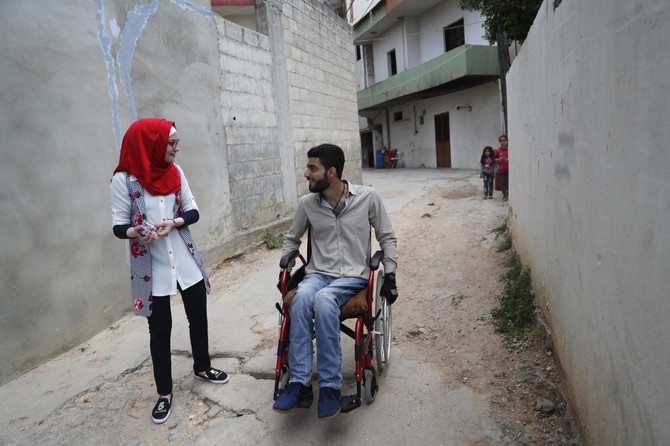
World Central Kitchen stops work in Rafa after ‘attacks’
The charity had recently resumed its work in Gaza after suspending operations in April
RAFAH, Palestinian Territories: The World Central Kitchen nonprofit, which provides meals in war-torn Gaza, said it had stopped its operations in the Palestinian territory’s southern city of Rafah due to “ongoing attacks” in the area.
The US-based charity was founded by celebrity Spanish-American chef Jose Andres to provide food to communities facing humanitarian crises and disasters.
“In the face of Israeli operations in Rafah, countless families are being forced to flee once again,” the charity said on social media platform X late on Tuesday.
“Ongoing attacks have forced us to pause work at our main kitchen in Rafah and relocate many of our community kitchens further north.”
The charity had recently resumed its work in Gaza after suspending operations in April following the killing of seven of its workers in three air strikes by an Israeli drone.
The deaths — of an Australian, three Britons, a North American, a Palestinian and a Pole — had triggered a global outrage over Israel’s military operations.
An internal Israeli military inquiry found that the drone team had made an “operational misjudgment” after spotting a suspected Hamas gunman shooting from the top of an aid truck.
In recent weeks, fighting in Rafah has intensified after the Israeli military began its ground assault there on May 7 after seizing control of the crossing between Gaza and Egypt.
Gaza officials said an Israeli strike on Sunday set ablaze a crowded camp for displaced people in Rafah, killing 45 and wounding dozens.
Israel’s military said it has launched an investigation into the strike but insisted its munitions alone “could not” have caused the deadly blaze.
Since the start of the Rafah assault, delivering aid into Gaza has become more difficult, aid agencies say.
Even when medical and other aid makes it into Gaza, it remains “very challenging” to transport and deliver the goods both in the south and to the north, Rik Peeperkorn, the World Health Organization’s representative in the Palestinian territories, told AFP on Tuesday.
Houthis claim second ship attack in Mediterranean

- The missile and drone forces hit a Greece-flagged oil and chemical ship, Minerva Antonia, in the Mediterranean,
- Those ships were targeted because they breached a ban on sailing to Israel
AL-MUKALLA: Yemen’s Houthi militia on Wednesday said that they had attacked another commercial ship in the Mediterranean as part of the fourth phase of their missile and drone campaign against ships in support of the Palestinian people.
Houthi military spokesperson Yahya Sarea said that the missile and drone forces hit a Greece-flagged oil and chemical ship, Minerva Antonia, in the Mediterranean, the second such claim in less than a week.
He also said the militia had attacked the Marshall Island-flagged bulk ship Laax and the Malta-flagged bulk carriers Morea and Sealady in the Red Sea.
Those ships were targeted because they breached a ban on sailing to Israel.
The Houthi official said that they launched cruise missiles against two American ships, Alba and Maersk Hartford, in the Arabian Sea.
Last week, the Houthis claimed their first strike on a ship in the Mediterranean, as they extended their missile and drone operations into new waters.
Since November, the Houthis have seized one commercial ship, sunk another, and fired hundreds of ballistic missiles, drones and remotely controlled and explosives-laden boats at commercial and naval ships in international waters off Yemen, as well as in the Indian Ocean and the Mediterranean.
The Houthis say they want to put pressure on Israel to end its war on Gaza while also targeting US and UK ships for backing Israel and bombing Yemen.
The Houthis’ announcement of new attacks came hours after the US Central Command reported that the Houthis fired five ballistic missiles from areas under their control at international ships in the Red Sea on Tuesday, three of which struck the bulk carrier Laax.
According to the US military, the ship’s crew is safe and sailing to its destination and that neither the US-led marine coalition nor any other international ship reported being hit by the other Houthi missiles.
Five drones fired by the Houthis over the Red Sea on Tuesday morning failed to reach their target after being destroyed by CENTCOM forces.
Two UK maritime agencies reported on Tuesday that a commercial ship in the Red Sea was damaged after being struck by three missiles off Hodeida in Yemen.
At the same time, Houthi media said on Tuesday that US and UK aircraft carried out two raids on the Al-Jabanah area in the western province of Hodeida, but provided no specifics about the targets.
The US and the UK have conducted airstrikes on Houthi-controlled Yemen, saying they are targeting drone and missile launchers as well as storage sites.
Arab League chief to attend China-Arab Cooperation Forum in Beijing

- The event will be attended by China’s President Xi Jinping and Foreign Minister Wang Yi
- The meeting in Beijing aims to provide a platform for the exchange of views on regional and international issues, particularly the Palestinian cause
CAIRO: Ahmed Aboul Gheit, the secretary-general of the Arab League, will on Thursday attend the 10th session of the ministerial meeting of the China-Arab States Cooperation Forum in Beijing.
The event will be attended by China’s President Xi Jinping and Foreign Minister Wang Yi, as well as monarchs and political leaders from several Arab countries.
Aboul Gheit’s spokesperson, Gamal Roshdy, said the visit would include a number of meetings with senior Chinese officials, including Wang and Vice President Han Zheng.
The meeting in Beijing — which comes after Aboul Gheit met EU foreign ministers to discuss the Palestinian cause earlier in the week — aims to provide a platform for the exchange of views on regional and international issues, particularly the Palestinian cause, which remains a priority for the Arab League, especially in light of efforts to achieve a ceasefire in Gaza.
To mark the 20th anniversary of the founding of the China-Arab States Cooperation Forum, Roshdy said the Arab League had produced a commemorative book that highlighted some of the key milestones in its history.
The forum is a framework for dialogue and cooperation between Arab states and China. Its founding document was signed in September 2004 at the headquarters of the Arab League in Cairo, following a visit by then Chinese President Hu Yintao.
Egypt to host Sudan peace conference next month

- The ministry said it was part of Egypt’s “unremitting efforts and endeavors” to put an end to the ongoing war in Sudan
- The conference will be held in the presence of relevant regional and international partners
CAIRO: Egypt will next month host representatives of Sudan’s civil and political groups in a bid to bring peace and stability to the country, the Egyptian Foreign Ministry said.
The offer to hold the event stemmed from the belief that the “current conflict in Sudan is basically a Sudanese issue and that any future political process should include all national stakeholders on the Sudanese scene, and within the framework of respecting the principles of Sudan’s sovereignty, unity and territorial integrity, non-interference in its internal affairs, and preserving the state and its institutions,” the ministry said.
The conference will be held in the presence of relevant regional and international partners and seek to achieve consensus among Sudanese forces on ways to build a comprehensive and lasting peace.
The ministry said it was part of Egypt’s “unremitting efforts and endeavors” to put an end to the ongoing war in Sudan and within a framework of cooperation and integration with the efforts of regional and international partners, especially Sudan’s neighboring countries, the parties to the Jeddah talks, the UN, African Union, Arab League and the Intergovernmental Authority on Development, an eight-country trade bloc in Africa.
Egypt looked forward to the effective participation of all and concerted efforts to ensure the conference succeeded in achieving the aspirations of the Sudanese people, it said.
Brazil recalls ambassador to Israel: diplomatic source

- Relations between Brazil and Israel have soured over the conflict
BRASILIA: Brazil has recalled its ambassador to Israel and will not immediately appoint a replacement, a diplomatic source told AFP Wednesday, ratcheting up tensions between the two countries over Israel’s war in Gaza.
Relations between Brazil and Israel have soured over the conflict, with Brazilian President Luiz Inacio Lula da Silva in February accusing the Israeli government of “genocide.”
Israel reacted furiously, declaring the Brazilian leader “persona non grata.”
Israel had previously summoned the South American country’s ambassador Frederico Meyer to a meeting at the Yad Vashem Holocaust memorial center in Jerusalem, which the Brazilian source said “was a humiliation to which (Meyer) was subjected.”
In response, Brazil recalled Meyer for consultations, and in turn summoned Israel’s representative in Brasilia.
The source said conditions had not been met for Meyer “to return” to Israel.
The Brazilian representation in Israel in the meantime will be led by diplomat Fabio Farias.





